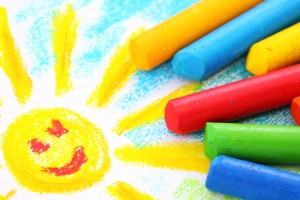Kindergarten and Preschool
CAREHOOD – The Kindergarten and Preschool of the German International School Chennai
The aim of the founders and staff of the CAREHOOD Kindergarten is to provide your child with positive and stimulating care each and every day. We deploy two teachers per group, and the international nature of our team provides the children with an environment which far exceeds the normal standard in terms of the pedagogical and human quality we are able to offer.

We offer your child a second home.
The watchwords of CAREHOOD are play and learning, support and independence, quietness and activity, individuality and solidarity, security and adventure, freedom and limits. All of this creates exactly the right mix for your child to develop the skills and confidence which will enable him or her to grow into a life-embracing and autonomous personality and lays down the vital foundations for later success at school. The cornerstones of our pedagogical concept include the active fostering of cognitive skills and creativity, the imparting of values and social competence and the promotion of a sense of responsibility for nature and the world around us. We also encourage tolerance for other cultures and forms of life backed up by the bilingual education we provide.
Pedagogy
We seek to make a major contribution to the development of your child’s character. The aim is to encourage a life-affirming personality and enable the fostering of a sense of discovery and of social skills.
Our primary focus is on imparting a deeply rooted enjoyment of life and a healthy degree of self-esteem.
In order to achieve this, we constantly strive to strike the right balance by mixing phases of affectionate attention, active learning, free play, joint activity and peace and quiet. The core of our underlying pedagogical concept is the adoption of what we term a “situation-oriented approach”. This involves according due consideration to children’s individual needs at any given time and the recognition and encouragement of the uniqueness of every single child.
We use the development of such basic skills as openness, attentiveness and social competence to establish a strong foundation for optimum early years education and support. We encourage the furtherance of such skills by providing a plethora of positive stimulation experiences in all educational areas. We make full use of the enormous degree of motivation and desire for knowledge which young children display and provide them with the guidance they need to explore the world independently through play.
Our pedagogical concept is based on the Thuringian Nursery Education Plan. The underlying philosophy of this approach centres on absolute acceptance of and valuing of your child.
The focus is on supporting and fostering each child’s sense of self-esteem and his or her own individual strengths.The further cornerstones of the pedagogical approach adopted by CAREHOOD are as follows,
- autonomous learning based on discovery and play
- support within small groups offering age-appropriate activities
- individual support provision based on targeted observation
- specific fostering of sensory perception
- the imparting of values and manners
- acceptance of limits and rules within the community
- establishing an understanding of regulatory structures and of the rules of hygienics
- creating awareness of the needs of other children

- developing an interest in other cultures and languages and encouraging an attitude of openness and tolerance in this regard
- fostering a sense of responsibility for adopting a careful approach to nature and the environment
- learning the English/German language through play.
We attach particular importance to good healthy nutrition, to eating together and to learning about hygiene. We have our own kitchen and smart sanitary installations in place to assist us in these aims. We organise our premises in such a way so as to create a second home environment for your child. We divide the group room into different “areas”, one for eating, one for painting and handicrafts and one for climbing and “hide-and-seek”. We also have separate zones for cuddling and play. The school offers quiet rooms and facilities for children to be on their own and also features an attractively designed outside area for major and minor explorations of the natural world. Facilities are bright and generously proportioned and decorated in warm and soothing colours. There is a range of round and angular shapes and fixed and moveable elements to explore. We also have a wide selection of various play materials.
And we have enough space to accommodate your child, your child’s thoughts, your child’s favourite games, your child’s works of art and much more besides.
Bilingualism
 Germany still lags behind such countries as Switzerland and Belgium and areas of Africa and North America in the importance it attaches to the issue of the bilingualism or multi-lingualism of children. This is a pity. All children have a congenital ability to grow up speaking more than one language. Most linguists agree that multilingual education should begin as early as possible.
Germany still lags behind such countries as Switzerland and Belgium and areas of Africa and North America in the importance it attaches to the issue of the bilingualism or multi-lingualism of children. This is a pity. All children have a congenital ability to grow up speaking more than one language. Most linguists agree that multilingual education should begin as early as possible.
Children who are immersed in a second language during their early years enjoy considerable benefits in learning foreign languages later, an area which is becoming increasingly significant. The aim of bilingual education is not that children should be fluent in English and German at the age of 3. The important thing is that it becomes second nature to a child growing up to be able to communicate in several languages easily via the medium of play. Foreign language work is conducted by native speakers who provide English language support for all everyday activities within the nursery. The two other support staff in the group concentrate on making sure that the children receive age-appropriate German language linguistic stimulation and development.
Find out more about our Kindergarten Concept and find out more about our Preschool Concept
